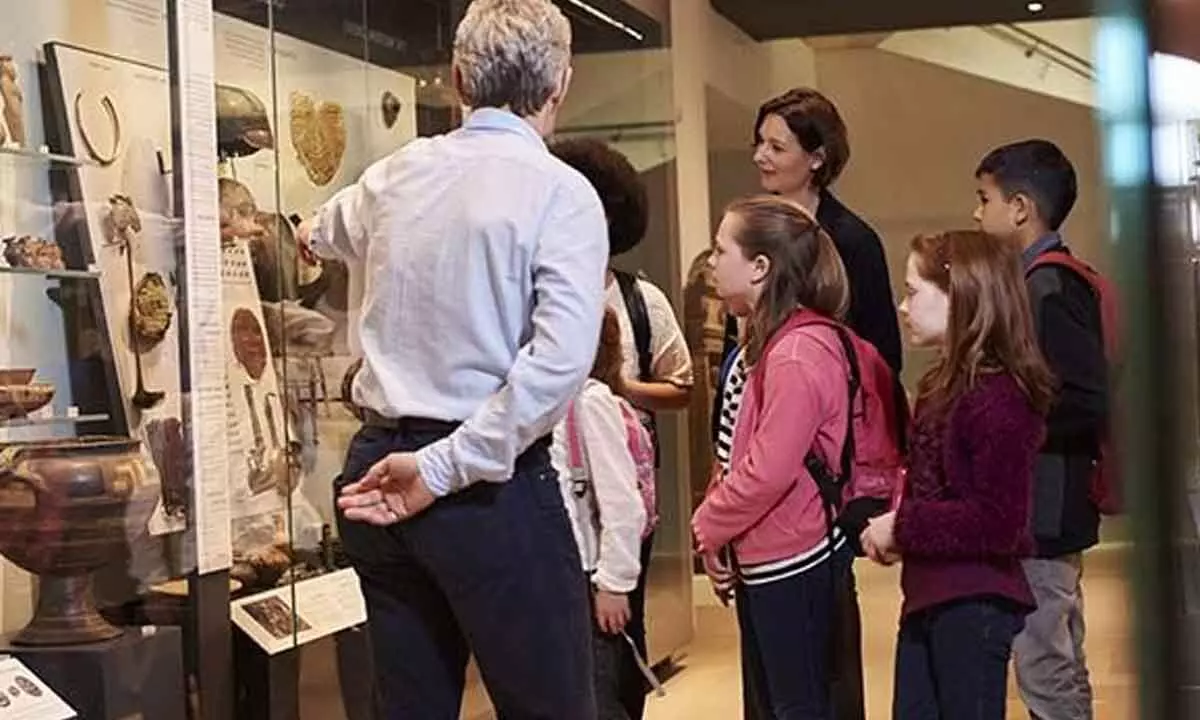Museum’s role in cultivating young artistic minds

In today’s digital age, where children are increasingly disconnected from the physical world, museums play a vital role in grounding them in their cultural heritage and fostering a deep appreciation for the arts. As we celebrate International Museum Day, let us reaffirm our commitment to nurturing tomorrow’s art connoisseurs through enriching museum experiences. By investing in children’s visits to museums, we invest in a future that values creativity, cultural understanding, and lifelong learning
As the world gears up to celebrate International Museum Day, it is an opportune moment to reflect on the significance of Museums, particularly in nurturing the next generation of artenthusiasts. In today’s fast-paced digital age, where screens dominate children’s attention,museums stand as fortresses of cultural heritage and artistic exploration. They are sanctuarieswhere the past and present converge, offering a tangible connection to the myriad expressions of human creativity.
Drawing from my experiences as an active member of the Contemporary Indian Art scene, I have witnessed firsthand the transformative power of museums on young minds. Here is why I firmly believe children’s visits to museums are paramount for cultivating visual arts appreciation and education:
1. Early Exposure to Art
Introducing children to art at a young age ignites their imagination and nurtures a lifelong appreciation for creativity. Museums offer a rich tapestry of artworks that can captivate young minds and inspire them to explore the world of Visual Aesthetics. This early exposurehelps children develop a keen sense of observation and a deeper understanding of artistic expressions.
2. Educational Benefits
Museums provide educational programs and exhibits tailored to children, complementing their formal education, and enriching their understanding of history, culture, and artistic techniques. These programs often include workshops, guided tours, and interactive sessions that make learning engaging and fun. For instance, the National Museum, National Gallery of Modern Art, Lalit Kala Akademi and some private Art Galleries and Museums across India and of course around the world offer a variety of educational activities designed to spark curiosity and foster learning in young visitors.
3. Development of Critical Thinking
Interacting with Art encourages children to think critically and interpret visual information, honing their observation and analytical skills. By engaging with diverse artworks, children learn to ask questions, make connections, and draw conclusions, which are essential skills in both academic and real-world contexts.
4. Cultural Awareness
Museums expose children to diverse cultures and historical periods through art, fostering empathy and appreciation for cultural diversity. Exhibits showcasing Indian heritage alongside global artworks help children understand and respect different cultural narratives. The Chhatrapati Shivaji Maharaj Vaastu Sangrahalaya in Mumbai, Kiran Nadar Museum of Art in Delhi, Nita Mukesh Ambani Cultural Centre in Mumbai and many more, for example, offer a a rich collection of artefacts from across India and the world, promoting a sense of global interconnectedness.
5. Inspiration for Creativity
Experiencing various forms of art in museums can spark children’s creativity and encourage them to express themselves through artistic endeavors. Museums often host workshops where children can try their hand at different artistic techniques, providing a platform for self-expression and creative exploration.
6. Emotional Development
Art has the power to evoke emotions and facilitate emotional growth and empathy in children, helping them understand and articulate their feelings. By engaging with artworks that depict a range of human experiences, children can explore their own emotions and develop a greater sense of empathy and compassion.
7. Family Bonding and Social Skills
Museum visits offer opportunities for families to bond over shared learning experiences and for children to develop social skills through interaction with other visitors and participation in group activities. Family-friendly exhibits and events, such as those at Victoria Memorial in Kolkata, Dr Bhau Daji Lad Museum in Mumbai, Heritage Transport Museum in Haryana to name few provide a welcoming environment for families to learn and grow together.
8. Encouraging Lifelong Learning
A visit to a museum can instill a sense of curiosity and a love for lifelong learning in children, motivating them to seek out cultural and educational experiences as they grow older.
Museums like the Birla Science Museum in Kolkata and the Partition Museum in Amritsaroffer dynamic and evolving exhibits that keep visitors coming back, fostering a habit of continuous exploration and learning.
9. Access to Expertise
Museums often have knowledgeable staff and guides who can provide valuable insights and enhance the learning experience for children. Expert-led tours and interactive sessions help demystify complex concepts and make art and history accessible to young minds.
10. Hands-On Learning
Interactive exhibits and activities in Museums engage children in hands-on learning experiences, making art education tangible and memorable. Institutions like the Children’s Museum in Chennai, National Children Museum in Delhi, Regional Science City for interactive science and technology museum specializes in interactive exhibits that encourage children tolearn by doing, promoting active and experiential learning. In today’s digital age, where children are increasingly disconnected from the physical world, museums play a vital role in grounding them in their cultural heritage and fostering a deep appreciation for the arts. As we celebrate International Museum Day, let us reaffirm our commitment to nurturing tomorrow’s art connoisseurs through enriching museum experiences. By investing in children’s visits to museums, we invest in a future that values creativity, cultural understanding, and lifelong learning.
(The author is Dean, School of Visual Arts, World University of Design(WUD))




